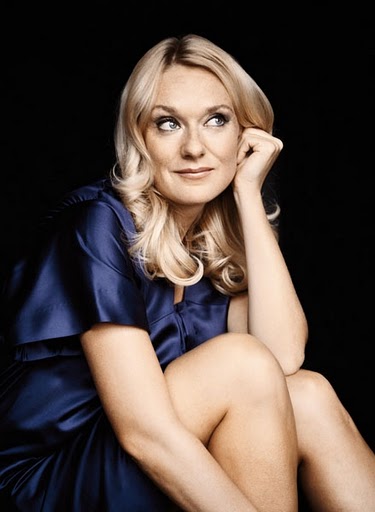Gilbert, Kožená and Philharmonic bring a fresh, modern touch to Berlioz and Rimsky

Magdalena Kožená performed Berlioz’s “Les Nuits d’été” with Alan Gilbert and the New York Philharmonic Thursday night.
There was a revivifying freshness about the New York Philharmonic’s Thursday night concert. It’s the start of a new season, of course, so a trip to David Geffen Hall to hear the orchestra feels new. But more profoundly, the programming was refreshing: Berlioz’ Les Nuits d’été and Rimsky-Korsakov’s Scheherazade.
Nominally the type of 19th century pieces that are considered warhorses, these works fall into the limbo of having well-known titles while being only infrequently heard. Their colors and seeming eccentricities—which are actually just the skilled ramifications of personal styles—are endlessly stimulating, and the exceptionally fine music making Thursday night revealed their substantial satisfactions.
Alan Gilbert led the program with a consistent unsentimental touch, and had an excellent partner in mezzo-soprano Magdalena Kožená in the Berlioz songs, heard before intermission. Kožená has a prototypical mezzo voice, not just in range but in sound. Rich and round, her vowels sound like lush orbs.
There was at times a slight unsteadiness in intonation in her low range, but her singing was even and expressive at every dynamic, especially piano. And this was a quiet performance, an approach that paid off handsomely in that the lowest dynamics seemed imbued with the most meaning. Maintaining a consistent range of pianissimo to mezzo-forte, the music seemed back-lit.
Enabled by excellent accompaniment from the orchestra, the words (by Théophile Gauthier), flowed through Kožená with the seeming ease with which Berlioz set them. The instrumental playing was exceptionally transparent, with emphasis from Gilbert on the clarity of each phrase and contrapuntal line. Voice and instruments were all placed in relief, heard to the fullest all the way through to the last note. Rubato was judicious and subtle.
This was romanticism for contemporary sensibilities, with appreciation for the allusions to love lost, and death, but with an emphasis on the art and not histrionics. It was sheer, concentrated beauty.
Scheherazade began with the requisite big, dramatic statement, then quickly settled into a slightly dry, though hard-edged, feeling. As with the Berlioz, this was in no way a drawback, as kindling needs to be dry to ignite.
The fire started smoldering after the first conversation between solo horn, oboe, violin, and flute (all accompanied by Carter Brey’s imperturbable cello). The solo work by all the principals was so outstanding throughout that the work approached the character of a concerto grosso.
Or a violin concerto. Concertmaster Frank Huang was superb, playing with a silvery tone, impeccable technique, and deep feeling. And the overall emphasis on clarity and the exactitude and completion of every phrase meant the music was heard as far more than just a dramatic narrative, a collection of effects.
Rimsky-Korsakov did a great deal with a small amount of material, using variation and structure to make a large-scale piece that keeps moving, and delivers the story, via compositional technique.
The quality of the thinking and playing carried through the relatively weak third movement (it lacks the rigor and invention of the others), and produced accumulating thrills and excitement. The coda of the second movement was breath-catching, and the power of the orchestra at the final climax was jolting and intense. Leave it then to a cell phone to ring loudly and obnoxiously during the quietest part of Huang’s final, tender solo.
Concerts like this can be easy to take for granted, and this was as impressive as any concert one is likely to hear this season.
The program will be repeated 8 p.m. Friday and Saturday. nyphil.org